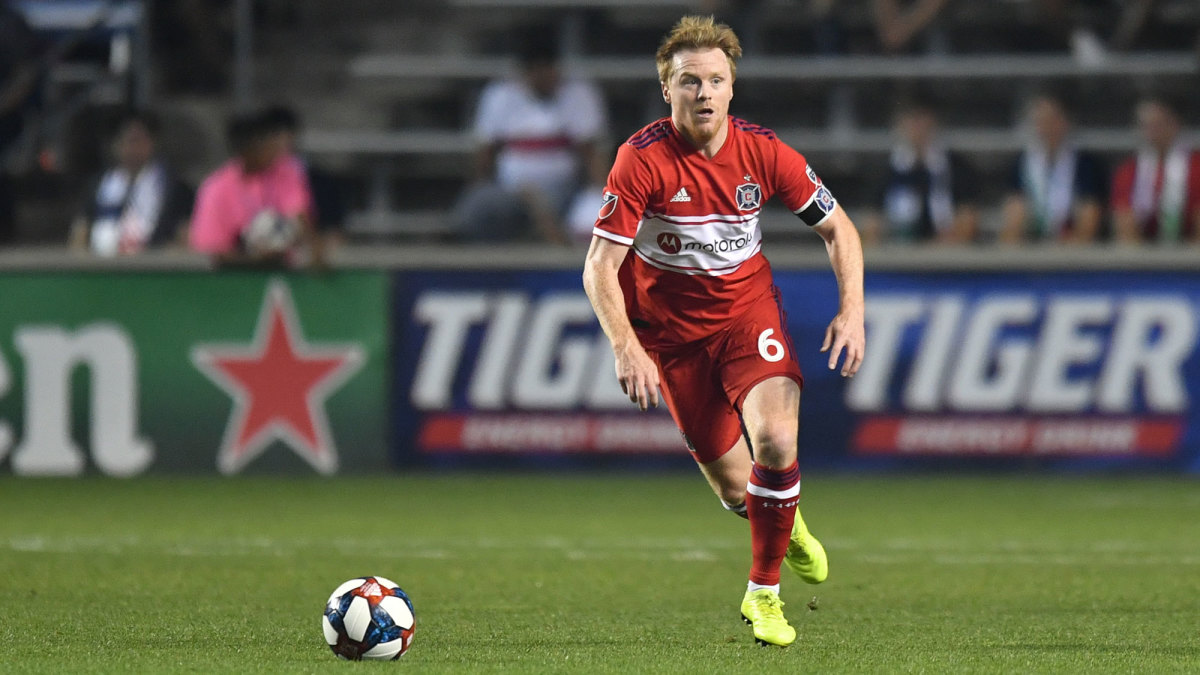MLS Veteran McCarty Details State of CBA Talks, Progress Compared to Past Years

LOS ANGELES — This isn’t Dax McCarty’s first rodeo in MLS. The rugged midfielder is 32 now and about to begin his 16th season in the league. He has captained the last three teams he’s been on—D.C. United, the New York Red Bulls and Chicago Fire—and he’s likely to wear the armband again for his new team, Nashville SC, when it starts MLS play this season.
McCarty is also a team rep for the MLS Players Association, whose collective bargaining agreement with the league expires on January 31, so he’s an ideal player to talk to about the past and the present of MLS labor relations—which is what we did recently at MLS Media Day.
“I came into the league in 2006, and there were 10 teams [compared to 26 this season],” McCarty told SI. “And the league basically just said, you know, ‘We're going to do whatever we want. You guys have to kind of accept these terms, and you're not really going to be able to fight us against it because you don't have the power.’ And to see where the players association is now with upwards of 30 to 40 people on staff, extreme lines of communication, players all on the same page—regardless of where you come from, regardless of your background—that fills me with a lot of pride, because we're a lot stronger than we were back when I first started doing this.”
Next week is a big one for negotiations between the two sides. The players have been clear publicly about many of their priorities: More money for player salaries, increased free agency within the league, a greater number of charter flights during the season and a decrease in the number of spending buckets for players like targeted allocation money (TAM).

“I think the most important thing, to be quite honest, is just more money in the player pool available for every player,” McCarty said. “And I say that because the league has all these different mechanisms to which they can go and acquire players. And I think it actually kind of dilutes the player pool in a sense, that it's only available to certain players. So I think as a players association, we wouldn't be doing ourselves any favors if we didn't try to open up that bag of cash, if you will, to the entire player pool, because then that raises the whole level of the entire league.
“The league is actually very strategic about how they want to do things,” he continued. “But us as a players association, we obviously have to look out for our brothers in arms and everyone together. Because, sure, you have the high-priced DPs and even the TAM players, who are incredibly important to building stadiums and to building that momentum in the support in the stands. But you also have the young homegrown kids, and you have guys coming from college who have also proven that under the right circumstances they can be very successful in this league, too. And so I think just opening up the total pot and money to the entire player pool is very important for us.”
McCarty himself is a prime example of an American player who competed in the college game (at North Carolina) and fought to make himself an important longtime player in the league, even though he never left to play in another country.
The vibe about labor talks in L.A. among players and other league executives was mostly positive last week, with people on both sides saying they were optimistic that a deal would be reached without having last-second concerns about a work stoppage. But the players side is quick to caution that they’re better prepared than ever to deal with a strike or lockout if one happens.
“I feel good about the tone of the league and the way that they've handled these negotiations,” McCarty said. “I think one very big positive that has happened, as opposed to the last negotiations [in 2015], is we're not starting late. You know, we have started these negotiations almost a year and a half ago because we didn't want to have to come down to a deadline. But ultimately, look, these labor negotiations are never easy. Both sides never want to budge too much, and it's always a little bit of give and take. So the tone from the meetings has been very positive. Obviously, we're still far apart on a few different issues, but to me, where we were at last negotiation and where we are in this negotiation is a lot more positive.”
“I'm very optimistic that an agreement can be reached,” McCarty continued. “But I would be remiss if I didn't say that the players have never been stronger, and the players have never been more on the same page and more in line with how we communicate and where we want this league to go. And so the power of the players association is extremely strong, and we are ready to do whatever it takes to get what we feel is a fair deal.”
